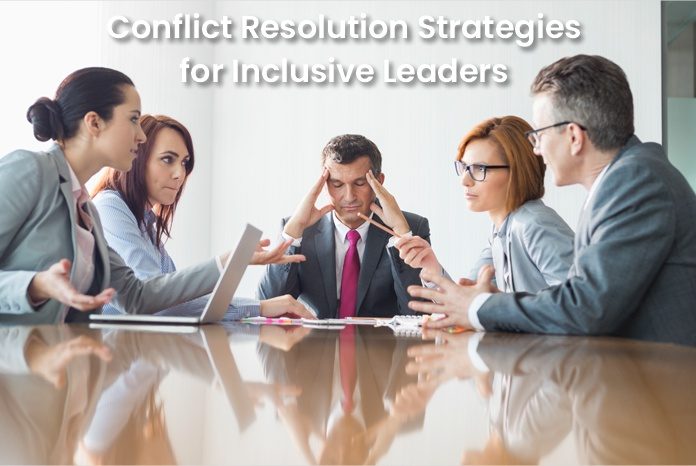Leadership consulting is a business service that engages in the evaluation of current management and supervisory strategies and assists the corporation in developing inherent leadership qualities among both managers and employees in general. Although it’s one of the most valuable skills you can have in today’s professional world, conflict management is something that many individuals shy away from but it is an extremely valuable skill that should be mastered to be an effective leader.
Understanding Conflict Resolution: Conflict Resolution Is First Mindset And Then Skillset
Conflict is a disagreement or argument that can arise in various circumstances and settings, including in the workplace. Workplace conflict can happen for many different reasons, including disagreements about work procedures, different or unmet needs, interests or ideas of employees, and basic personality clashes. It is helpful for managers to acknowledge the impact of workplace conflict and know how to quickly and effectively resolve it.
Conflict can be a healthy and important part of any relationship, especially those at work. They are a normal part of healthy relationships and a work environment. It means that people are actively negotiating their needs and expectations with others, and that’s exactly what helps us stay happy with our interactions at the workplace.
Skills that can help navigate conflict successfully
- Active listening: Active listening focuses on being attentive to what the other person has to say. This skill is commonly used by salespeople to better connect with customers during a pitch, but it’s also a universal competency that any consummate professional should master.
- Taking Perspective: To resolve conflict constructively, so that all parties are satisfied with the outcome, a person must be able to hold all the opposing ideas, positions, and perspectives in mind at the same time and still function effectively.
- Facilitation: When there is conflict, you can arrange the environment around you to make resolution easier. For example, a manager who oversees two different groups might bring those groups together in a comfortable conference room to address points of disagreement on a joint project. Providing time and space for discussion can facilitate a speedy end to the conflict.
- Emotional Intelligence: Emotional intelligence describes the ability to perceive and understand other peoples’ emotions as well as your own. This skill is essential when managing conflict because it prevents the situation from escalating. Recognizing and curtailing confusion, anger, and frustration from the conflict leaves space for everyone involved to think creatively and logically about a solution.
- Mediation: Mediation is when a neutral third party is involved in the resolution of a conflict. A mediator can be a trained professional, someone from an outside group (such as HR), or a person outside the conflict who can provide an objective perspective. In addition to all the other skills listed here, a successful mediator can summarize what they are hearing and observing to demonstrate progress and agreement.
- Problem-solving: Problem-solving skills help you determine the source of a problem and find an effective solution. During conflict resolution, a manager might use their problem-solving skills to identify areas of compromise between two team members who disagree. Having a positive attitude going into the conflict can help other participants who may be wary of the interaction feel more at ease.
- Responsibility: The ability to hold people responsible for their actions is important in conflict resolution. For example, when an agreement is reached, an HR representative may need to check in a few days later to make sure everyone is still on the same page.
- Open Communication: Creating an open line of communication between the parties is the best approach for fostering a healthy, long-term relationship post-conflict. This allows both parties to check in on one another and make sure that both ends of the agreement are being upheld.
A few tips that are recommended to consider when approaching your next conflict:
-
- Use “yes, and” statements.
- Don’t point fingers.
- Let the person explain themselves, and actively listen.
- Maintain a calm tone.
- Show a willingness to compromise or collaborate.
- Don’t talk behind people’s backs.
- Don’t take anything personally.
- Pay close attention to nonverbal communication.
- Stay Positive
Body language
Body language can tell you when someone is saying one thing but means another. By being emotionally aware you can notice when someone’s posture, gestures, or facial expressions differ from their words. When someone says “I’m fine,” you can tell they’re not fine if they avert their eyes. Then, you can create an environment that makes that person feel more comfortable being honest with you. The importance of body language is that it assists us in understanding and decoding what the person is saying. Body language also helps interpret other people’s moods and emotions. Apart from this, it enhances our conscious understanding of people’s reactions to what we say and how we say it.
Setting Boundaries
Before diving head-first into the conflict discussion, establish boundaries upfront for all parties to follow. These can include the following:
- Reminding everyone that the conflict is not personal
- Asking everyone to keep the discussion confidential
- Trusting everyone to manage their emotions and not make outbursts, hurtful remarks, or make untrue statements





